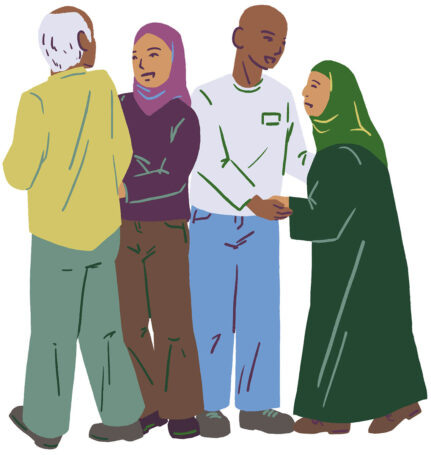March 23, 2023
A youth-led Muslim collaborative is addressing anti-Black racism one conversation at a time
When it comes to tough conversations, timing, substance and format are often the difference between a good-faith dialogue and a heated shouting match. It’s a lesson that lead to the creation of the Muslim Anti-Racism Collaborative (MuslimARC), when a group of young people organized a virtual town hall to address anti-Black racism in Muslim spaces.
“We encouraged the board [of Al Rashid Mosque] to hop on a Zoom call with the community that ended up going downhill really quickly,” says Noha Tarabain, who helped put the initial meeting together in the wake of the George Floyd protests and is a member of MuslimARC. “There was a lot of built-up emotion and hurt and trauma in the community that was shared on that call.”

The roots of anti-Black racism in the Muslim and Arabic-speaking world crosses cultural and geographic lines, often running just as deep as they do in the West. Centuries of slavery in the Middle East — a practice collectively referred to as the “Arab Slave Trade” — claimed the bodies of over 10 million Africans, and today, thousands of Black migrant workers find themselves literally trapped by the kafala system employed in the Gulf States, a system where migrant workers are often exploited by Middle Eastern governments and private companies.
On one hand, the very existence of anti-Black racism in Muslim-majority spaces seems antithetical to the tenets of the faith. Both the Qu’ran and Hadith espouse messages of cultural and racial unity, and Islam has served as a theological and idealogical home for many prominent Black civil rights leaders. According to a 2017 study by the Pew Research Centre, no single racial or ethnic group makes up more than 30 per cent of the total Muslim population. But while that plurality should be — and often is — a source of strength, it can also double as a fault line in Muslim communities writ large, including here in Edmonton.
“Because these are micro-aggressive racisms, these people generally don’t realize what they’re doing is wrong,” says Muna Ahmed, a MuslimARC member who joined the collaborative after the initial town hall in June 2020. “They haven’t thought, ‘Why am I thinking like this? Why am I not offering the Friday prayer in different languages? Why are we not open to serving different types of food at our gatherings?’”
With the lessons of their initial effort still fresh in their minds, the members of MuslimARC decided to start a dialogue with an entirely different approach: small-scale, intimate conversations. The youth-led collaborative partnered with the John Humphrey Centre to organize three engagement sessions in summer 2021 to get first-hand perspectives on anti- Black racism in Edmonton’s Muslim communities. The sessions invited small groups of Black Muslims to discuss their experiences with each other and with Black and Muslim mental health therapists, whose presence was made possible by a $10,000 grant from Edmonton Community Foundation.

“The engagement sessions were really done to create a safe space for Black Muslims to share their experiences,” says Ahmed. “We had mental health therapists there who grounded us in the beginning, who regrounded us in the end and who were available if anybody needed to go to the side and interact with them.”
In addition to demystifying anti- Black racism, even in largely non- white spaces, the sessions were also a launchpad for meaningful community action. Participants were encouraged to volunteer at religious gatherings, push for more widespread bias training and apply for positions on the board of Al Rashid Mosque.
Four Black applicants — including Ahmed — were ultimately selected to sit on the board of Edmonton’s largest and Canada’s oldest mosque. For Ahmed, having more Black decisionmakers at the site of so much past pain, prayer and praise is a step towards building a truly inclusive Muslim community.
“These people who were harmed by their community still understood the importance of rooting everything in Islam,” says Ahmed. “The reason this harm was even possible is because it was not rooted in Islam. So it was very interesting to see things from the perspective of needing to come back to the roots of Islam and not just say that we’re doing it, but actively practise it.”
This story comes from our Spring 2023 Legacy in Action.